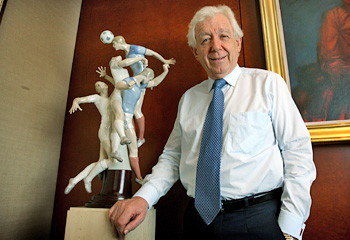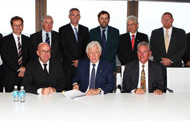October 8 – Football administrators in Australia have agreed to a “unified and unprecedented commitment” to work together in the best interests of the game.
A new National Charter spells out how the sport’s governing bodies should work together and details their respective roles and responsibilities in the implementation of the National Football Development Plan.
It also provides the framework to forge strong relationships between grassroots football and the Hyundai A-League.
Announcing the Charter, Football Federation of Australia (FFA) Chairman Frank Lowy, AC, said: “I firmly believe that we have made great strides since the formation of the FFA only six years ago.
“Nothing illustrates this more than the Charter we signed today.
“It reflects the fact that all stakeholders are united in transforming the game.”
The release of the National Football Development Plan in late 2007 was an historic milestone for the game in Australia.
It was the first time that a blueprint had been developed, in consultation with all the states and territories, to create a nationally cohesive framework for both talent identification and community football development across the country.
Together with the Member Federations, FFA has been rolling out key initiatives of the plan in such areas as participation, coach education, referee education, club development and women’s football.
“For example, last year we held the inaugural Indigenous Football Festival and we now have 150,000 children playing Optus small-sided football throughout the country, with this number growing every year,” said Lowy.
“We have a national youth league and a national women’s league which provide critical steps in the player pathway towards professional careers and national team representation.
“The role of the plan in creating the platform for future success on the world stage cannot be overstated.
“A key initiative of the plan for the development of the footballers of the future is the National Curriculum launched last year.
“This year we launched another key initiative - the Skills Acquisition Programme - which will be led by the FFA’s National Technical Director and the technical directors in each of the States and Territories.
 “I have no doubt that whatever happens with our World Cup bid, whoever is standing here in 2022 will point to the Charter to implement the National Football Development Plan and its core elements as key to the success of our national teams and of the Hyundai A-League,” said Lowy (pictured).
“I have no doubt that whatever happens with our World Cup bid, whoever is standing here in 2022 will point to the Charter to implement the National Football Development Plan and its core elements as key to the success of our national teams and of the Hyundai A-League,” said Lowy (pictured).
Speaking on behalf of the Member Federations, President of Football Federation Victoria Tony Dunkerley, said it was often forgotten by some just how far the sport has come in such a short space of time.
“Just six years ago football in Australia was fractured and required major reform,”he said.
“Since the establishment of the FFA, under Frank’s leadership, we’ve seen the establishment of the Hyundai A-League, the National Youth League and National Women’s League, been accepted into the Asian Football Confederation, played in the last two FIFA World Cup finals, won the 2010 Asian Women’s Cup and qualified for the women’s World Cup Finals, and agreed how to implement a detailed blueprint for the game’s future.
“Inevitably, the pace of this transformation has and will continue to present real challenges.
“However, I am confident that we have the unity, structures and maturity to address the challenges and achieve our game plan.”
Dunkerley also pointed out that the Charter formally reflects the strong relationships that have developed between FFA and the States and Territories in recent years.
“In essence, we’re doing this now and have been for several years - working together very closely and cooperatively.
“The Charter records our shared commitment to advancing the future success of football in Australia,” he said.
Lowy further stated that while the Charter has football development as its centrepiece it also recognises the strategic importance of the national domestic competition, the Hyundai A-League and the role that community engagement plays in growing the league.
“It is the fans that matter most and that is why both the Charter which we signed today and the new 10-year club participation agreements that the Hyundai A-League clubs recently signed create the platform for much greater grassroots community engagement,” said Lowy.
“This will be achieved through proposed cooperation agreements between each Member Federation and the relevant Hyundai A-League clubs.”
A copy of the Charter is available by clicking here.
Related stories
September 2010: A-League critics are “scare-mongering” claims Buckley
September 2010: Football in Australia needs shake-up claims leading official
September 2010: We have not taken our eye off the ball, claims Lowy

